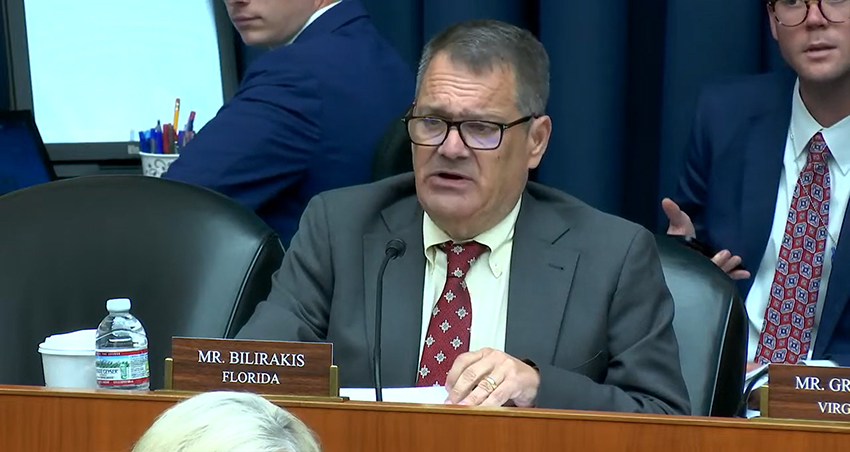During a busy week in Congress, House legislation to support drug development for pediatric rare diseases moved forward with bipartisan support, and a Senate committee highlighted the negative consequences of Inflation Reduction Act (IRA) price controls.
Here’s what happened on Capitol Hill during the week of Sept. 16, 2024.
PPRV reauthorization advances
Five-year reauthorization of the Rare Pediatric Priority Review Voucher (PPRV) program passed the House Energy & Commerce Committee by a unanimous 43-0 vote on Sept. 18. The PPRV is set to expire Sept. 30.
The PPRV was established by Congress in 2012 to encourage the development of drugs for children with rare diseases. Under the program, companies gaining approval for drugs targeting rare pediatric diseases can be awarded a voucher granting expedited review of another drug in the future. Drug makers can also fund drug research by selling the voucher to another company.
H.R. 3433, The Give Kids a Chance Act, was amended to include PPRV reauthorization as well as other pediatric legislation before being approved by the committee.
Why the PPRV matters
The Biotechnology Innovation Organization (BIO) has consistently pushed for PPRV reauthorization. BIO thanked the members of Congress who took leadership in introducing it into the House and getting it through the committee: Reps. Michael McCaul (R-TX), Anna Eshoo (D-CA), Gus Bilirakis (R-FL), Nanette Barragan (D-CA), Michael Burgess, MD (R-TX), and Lori Trahan (D-MA).
“As a father of two children with a rare disease, I am grateful that lawmakers are working together, on a bipartisan basis, to continue this vital program and hope it’s signed into law as soon as possible,” BIO President & CEO John F. Crowley said recently.
The Council of State Bioscience Associations (CSBA), a coalition of independent state and territory-based non-profit trade associations affiliated with BIO, wrote to congressional leaders on Sept. 9 explaining the importance of PPRV reauthorization.
“Since the start of the [PPRV] program, 53 vouchers for 39 rare pediatric diseases have been awarded which have led to innovations benefitting over 200,000 vulnerable patients. 36 of those rare pediatric diseases had no previously approved therapies,” said the letter.
The bill awaits passage by the full House. A Senate version of the legislation, S.4583, was introduced on Jun. 20 by Sens. Bob Casey (D-PA) and Markwayne Mullin (R-OK) and co-sponsored by Sens. Sherrod Brown (D-OH) and Susan Collins (R-ME).
‘The IRA waves a white flag’
At a Sept. 17 Senate Finance Committee hearing on the IRA, Chair Ron Wyden (D-OR) praised provisions to limit out-of-pocket costs for prescription drugs. He also called for legislation to reform pharmacy benefit managers.
In prepared opening remarks, Ranking Member Mike Crapo (R-ID) said the IRA’s price controls put the U.S. at a competitive disadvantage and discourage innovation.
“From a national security standpoint, as China supercharges its biopharmaceutical sector, the IRA waves a white flag, treating American job creators like adversaries,” said Sen. Crapo. “The implications for the therapeutic R&D pipeline are already apparent, with at least 21 drugs and 36 research programs discontinued since the law’s enactment.”
Sen. Crapo added that he was pleased to see bipartisan interest in reforming certain aspects of the IRA, including disincentives for orphan and small molecule drugs.
‘A classic issue with price controls’
Sen. Bill Cassidy, MD (R-LA) said the IRA provision granting small molecule drugs only nine years of protection from price controls as opposed to 13 years for biologics was changing investment decisions, regardless of the types of medicines we need. He asked witnesses about the resulting market distortion in drug development decisions.
“It’s well established that the size of the financial reward is related to how much is invested,” said Kirsten Axelsen, Non-Resident Fellow at the American Enterprise Institute and Senior Policy Advisor at DLA Piper. “If there’s less likelihood of financial reward, there’s going to be less investment in small molecules.”
“I would just say that this is a classic issue with price controls and the incentives they create that there will be resource allocation based upon the price controls and not where necessarily there’s value,” agreed Theo Merkel, Senior Fellow at the Paragon Health Institute and the Manhattan Institute.
Orphan drug provisions ‘already impacting innovation’
Sen. John Barrasso (R-WY) criticized the IRA for only protecting “orphan” drugs from price controls if they address a single rare disease, not multiple diseases.
“This type of disincentive is already impacting innovation. Multiple clinical trials looking at additional rare disease indications have been withdrawn,” he said. “Drug companies consider launching rare disease drugs abroad instead of doing it in the United States first. This is all the result of what I believe is a short-sighted and problematic policy.”
Axelson agreed the current orphan drug provisions in the IRA are a problem.
“The most efficient way to develop a drug is to develop a mechanism for a particular disease,” she said. “Once you find that it works on a certain part of the body, you can also find that it works on that part of the body to treat another disease. And that’s how rare diseases can be a profitable endeavor, by developing them for multiple rare diseases.”




